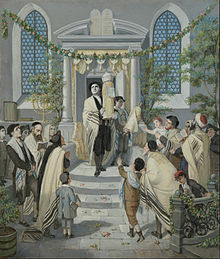Shavuot

Shavuot ( Hebrew שבועות 'Weeks' ; Yiddish: Schwu'ess , Schwuos or Schwijess ) is the Jewish harvest festival, which is celebrated 50 days, i.e. seven weeks plus one day, after the Passover festival.
importance
In the Torah the festival has several names, on the one handחג השבועות 'Festival of Weeks' ( 2 Mos 34.22 EU and 5 Mos 16.10 EU ),חג הקציר 'Feast of the Harvest' ( 2 Mos 23,16 EU ),יום הבכורים 'Day of the First Fruits' ( 4 Mos 28.26 EU ). Mishnah and Talmud also know the festival asעצרת Atzeret , German for 'solemn assembly' . The many names reflect the different meanings that the festival has.
This is how the Jews remember the renewed reception of the Ten Commandments on Mount Sinai . That is why Ex 19 EU , 20.1–23 EU are read from the Torah on the first day ; Maftir: Num 28.26-31 EU ; Haftara: Ezekiel 1.1–28 EU , 3.12 EU .
When it was first received, according to biblical tradition , Moses smashed the stone tablets with the Ten Commandments because the people of Israel worshiped the golden calf . Then Moses went back to the top of Mount Sinai to ask for the Ten Commandments one more time.
Shavuot is also a harvest festival , as this is the time when the first wheat is harvested in Israel .
Because the descent of the spirit on the disciples of Jesus happened according to the Christian-biblical Acts 2 : 1 on the Jewish festival of weeks (there in Greek: "Pentekoste", i.e. the 50th [day]), the Christian Pentecost arose from the Shavuot .
procedure
The festival of weeks marks the end of the spring festivals and the first fruits, which include Passover and the counting of the Omer .
The synagogue is decorated because on this day it symbolizes Sinai. The Ten Commandments are at the center of the Torah reading. They are read to a special tune, and while they are read the whole congregation stands. For this section, the rabbis or another leading member of the congregation is generally called to the Torah as a sign of special honor . Before this, a prayer is said in Aramaic accompanied by a special melody, the Akdamut , as is the blessing Shehechejanu . With him, permission is asked to begin reading the Torah at all. In addition to the Ten Commandments, the book of Ruth is also read. According to tradition, King David , the great-grandson of Rut, was born on the day of a Shavuot and died on such a day after 70 years.
Traditionally, milk is drunk, along with sweet, milky foods (pancakes with quark, cheesecake, etc.) and honey, since the Torah is compared to milk that the people of Israel eagerly drink like an innocent child.
Many believers study the Torah ( Hebrew תקון חצות Tikun Chazot , German for 'night watch' ). In the synagogues and yeshivot , the Talmud Torah schools, one generally stays awake all night and spends the time studying the Torah together (i.e. always two together). Rabbis and scribes also give lectures. From time to time the study is interrupted by singing and dancing, and so it goes on until dawn. Then everyone gathers for prayer at dawn to speak Shema Yisrael at sunrise .
Four times a year - on Yom Kippur , Shmini Azeret , on the last day of Passover and the second day of Shavuot - a special commemorative prayer is held according to the Ashkenazi rite,יִזְכֹּר Jiskor ("memory"), spoken in memory of the different souls of the father and / or mother in the synagogue. This includes a plea for Zedaka for their benefit. Only those whose father and / or mother are no longer among the living remain in the synagogue during the Jiskor prayer. Everyone else leaves the room in order to give the descendants a serious private moment in which they can reunite with their parents with the memory.
Shavuot in the Gregorian calendar
| Jewish year | Gregorian date |
|---|---|
| 5781 | May 17-18, 2021 |
| 5782 | June 5-6, 2022 |
| 5783 | May 26-27, 2023 |
| 5784 | June 12-13, 2024 |
| 5785 | June 2-3, 2025 |
Every feast day begins the evening before, because in the Jewish calendar the day lasts from the evening before to the evening of the day - not from midnight to midnight. The evening beginning is indicated by the word ( Hebrew ערב 'Evening' ) denotes Erev.
See also
Web links
- Shavuot - The Festival of Weeks. Central Council of Jews in Germany , accessed on December 21, 2018 .
- Michael Rosenkranz: Shavuot - Festival of the Torah. In: talmud.de. November 29, 2013, accessed December 21, 2018 .
- Adin Even-Israel (Steinsaltz): The Eternal Torah. In: de.chabad.org. January 20, 2007, accessed December 21, 2018 .
- Shavuot. The delivery of the Torah. In: de.chabad.org. December 21, 2018, accessed December 21, 2018 .
- Shavuot songs. In: synagoge-karlsruhe.de. Retrieved December 21, 2018 (English, sheet music, audio samples).
- Jews celebrate Shavuot. In: israelnetz.com. June 10, 2016, accessed December 21, 2018 .
- Ari Lipinski: The weekly festival of Shavuot. (PDF, 456 kB) Biblical background and traditions. In: AriLipinski.de. May 25, 2017. Retrieved December 21, 2018 .
- Andreas Nachama : Shavuot - Ten Commandments. What the Ten Commandments mean today and why Christians see them differently. In: ark.de. General Rabbinical Conference Germany , December 20, 2007, accessed on December 21, 2018 .